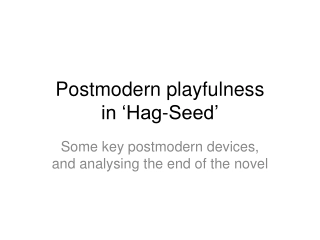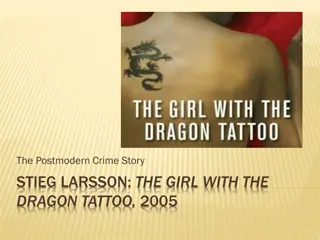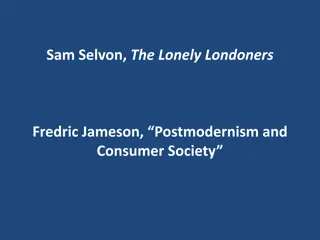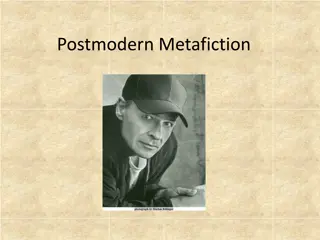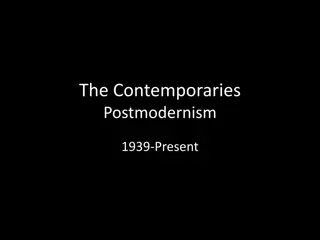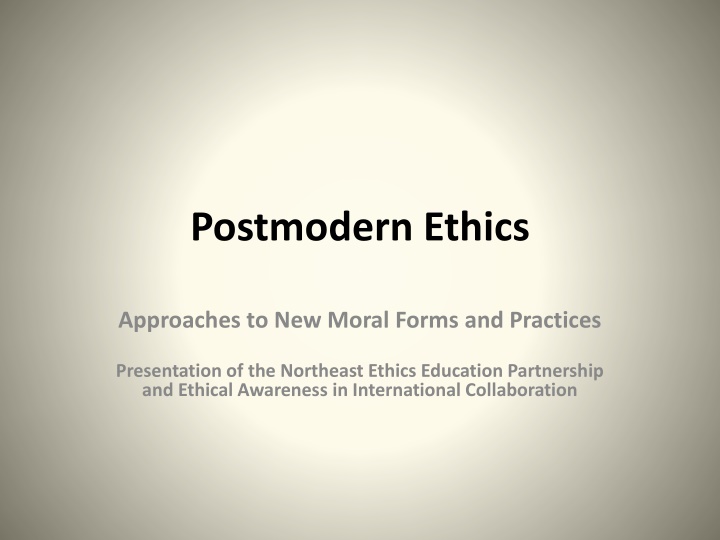
Exploring Postmodern Ethics: New Approaches and Considerations
Delve into the realm of postmodern ethics with a focus on navigating complex moral decisions in diverse cultural contexts. Discover how subjective understandings, humility, and a relational view of research subjects shape ethical practices. Uncover the importance of addressing structural inequalities, power relations, and engaging in emergent ethics through negotiation and communal discussions.
Download Presentation

Please find below an Image/Link to download the presentation.
The content on the website is provided AS IS for your information and personal use only. It may not be sold, licensed, or shared on other websites without obtaining consent from the author. If you encounter any issues during the download, it is possible that the publisher has removed the file from their server.
You are allowed to download the files provided on this website for personal or commercial use, subject to the condition that they are used lawfully. All files are the property of their respective owners.
The content on the website is provided AS IS for your information and personal use only. It may not be sold, licensed, or shared on other websites without obtaining consent from the author.
E N D
Presentation Transcript
Postmodern Ethics Approaches to New Moral Forms and Practices Presentation of the Northeast Ethics Education Partnership and Ethical Awareness in International Collaboration
Postmodern Ethics Contributions from postmodern ethics assist us with the complex moral decisions that involve diverse cultural contexts, values, linguistic styles, beliefs, etc. In postmodern ethics, subjective understandings of the self and the other assist us in building respect and identifying differences that can be worked into developing a deeper moral practice with diverse interests in decision-making. Photo by ed.isu.edu
Postmodern Ethics There is a need to have humility and a desire to consider all angles and situations. No research situation is isolated from broader social, economic and political circumstances. Multiple structural inequalities in research situations demand attention when we try to imagine ethical parameters . The first step would seem to be a recognition not just of potential chasms but of pre-existing subtler cracks and fissures with all their insidious ramifications (Gold 2001:3).
Postmodern Ethics Structural hierarchical conditions need discussion, unequal power relations and the blindness of researcher s power must be brought into view (Gold, ibid). Photo by purdue.edu
Postmodern Ethics In postmodern ethics, one is warned against the perception of the research subject as an isolated liberated self but to see instead a relational and contingent constitution of the subject. The person (research participant) is part of an embedded group or culture with beliefs, traditions, values and histories with that group.
Postmodern Ethics This requires an emergent ethics which would locate ethical discussion in the negotiation of individual and communal interests, through conversations and negotiations with community members instead of predetermined practices; to search there for ethics as well (Gold, ibid.). Photo by emitten.org.uk
Postmodern Ethics Postmodern ethics will bring forth the struggles for power. It seeks to achieve a juxtaposition of widely different genres, different philosophical idioms and a wide range of views. It encourages a discussion of what isn t working and what is the work to be done. ( Wyschogrod, E.1990, Saints and Post-Modernism, University of Chicago )
Postmodern Ethics Postmodern ethics promotes encounters with alterity, with otherness, where we can feel how our own conceptual moorings are under attack and we have a deep responsibility to open ourselves up to otherness. Postmodern ethics moves us toward open, playful, optative, disjunctive, displaced or indeterminate forms as we seek direction with complexity and uncertainties (Wyschogrod). Photo bookshop.blackwell.co.uk
Postmodern Ethics Narrative conceptions of ethics are needed; the life story , the multiplicity of voices, its openendedness. Languages of narrative and visual arts are discourses of power; what individual or group authorizes discourse; whose power supports what discourse (Wyschogrod).
Levinas and the Ethics of the Other Ethics is calling into question the same ; it is brought about by the other. The welcoming of the other by the same, of the Other by me is an ethic that produces the critical essence of knowledge. It is freedom, it is an idea of infinity, infinity is the absolute other. Photo by infinity.waw.pl
New meanings are in the presence of the other; the face is a living presence. Justice consists in recognizing the other as my master. To recognize the other is to recognize a hunger, to come out of possession of enjoyment, to transcend to the transcendent world of ideas.
Infinite ideas coming from a transcendent being, appeal to us, solicit us. In the ethical relation, I would not be the author of that relation, I can not picture how I would act in that relation, all that would be familiar would break away for the ethics of other.
Justice with the Other Justice is not an equilibrium, a fair distribution of goods and resources. Justice summons me to go beyond the straight line to the infinite and unexplored. The Other counts more than myself
Critchley and the Other Moral consciousness is not an experience of values but an access to the deep subjectivity of our own beings to places within ourselves that are outside our conscious control. An unfamiliarity with the movement toward that subjectivity will lead to a suppression of otherness in other human beings (Critchley). Critchley, Simon.1992. The Ethics of Deconstruction: Derrida and Levinas. Cambridge, MA: Blackwell Press

